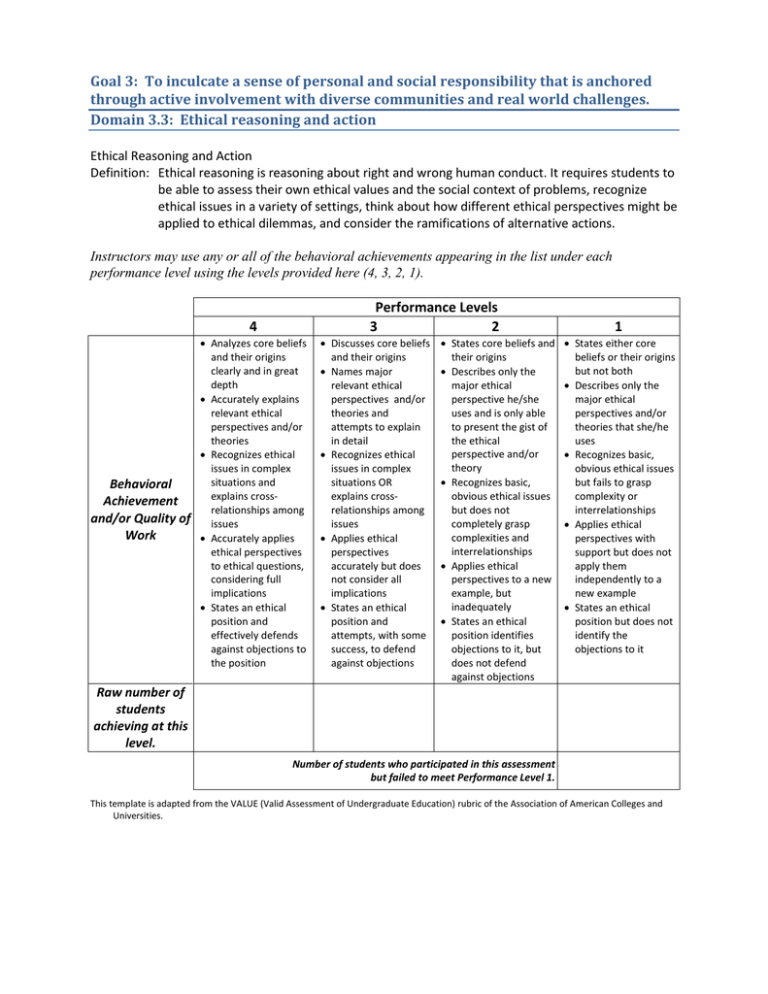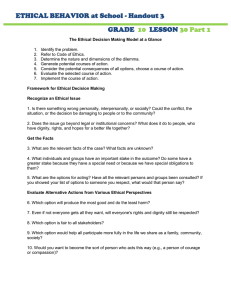Goal 3: To inculcate a sense of personal and... through active involvement with diverse communities and real world challenges.
advertisement

Goal 3: To inculcate a sense of personal and social responsibility that is anchored through active involvement with diverse communities and real world challenges. Domain 3.3: Ethical reasoning and action Ethical Reasoning and Action Definition: Ethical reasoning is reasoning about right and wrong human conduct. It requires students to be able to assess their own ethical values and the social context of problems, recognize ethical issues in a variety of settings, think about how different ethical perspectives might be applied to ethical dilemmas, and consider the ramifications of alternative actions. Instructors may use any or all of the behavioral achievements appearing in the list under each performance level using the levels provided here (4, 3, 2, 1). Performance Levels 3 2 4 Behavioral Achievement and/or Quality of Work Raw number of students achieving at this level. • Analyzes core beliefs and their origins clearly and in great depth • Accurately explains relevant ethical perspectives and/or theories • Recognizes ethical issues in complex situations and explains crossrelationships among issues • Accurately applies ethical perspectives to ethical questions, considering full implications • States an ethical position and effectively defends against objections to the position • Discusses core beliefs and their origins • Names major relevant ethical perspectives and/or theories and attempts to explain in detail • Recognizes ethical issues in complex situations OR explains crossrelationships among issues • Applies ethical perspectives accurately but does not consider all implications • States an ethical position and attempts, with some success, to defend against objections • States core beliefs and their origins • Describes only the major ethical perspective he/she uses and is only able to present the gist of the ethical perspective and/or theory • Recognizes basic, obvious ethical issues but does not completely grasp complexities and interrelationships • Applies ethical perspectives to a new example, but inadequately • States an ethical position identifies objections to it, but does not defend against objections 1 • States either core beliefs or their origins but not both • Describes only the major ethical perspectives and/or theories that she/he uses • Recognizes basic, obvious ethical issues but fails to grasp complexity or interrelationships • Applies ethical perspectives with support but does not apply them independently to a new example • States an ethical position but does not identify the objections to it Number of students who participated in this assessment but failed to meet Performance Level 1. This template is adapted from the VALUE (Valid Assessment of Undergraduate Education) rubric of the Association of American Colleges and Universities. Page 2 of Reporting Template Department/Program: Semester, Year of Assessment: Assessment Method: Course(s) Number (not section), student work product that was evaluated, brief description of the rubric or evaluation instrument used (a copy would be appreciated.) Executive Summary: Please briefly describe your findings, and your interpretations of the findings. Recommendations: Please provide any suggestions you have for improvement (e.g., from minor adjustments to the course, to changes to the assessment method, to major changes in KU’s approach to the learning goal)


